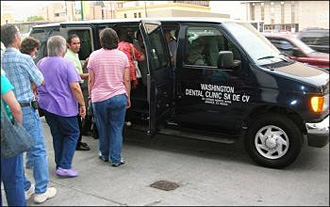 |
 |
 |
 Health & Beauty | October 2007 Health & Beauty | October 2007  
Throngs of Uninsured US Patients Seek Dental Care in Mexico
 Paula Bustamante - Agence France-Presse Paula Bustamante - Agence France-Presse
go to original


| | Americans board a shuttle bus in El Paso that offers free roundtrips to the clinic in Mexico and back. |
El Paso, TX - With aching teeth and a need to cut expenses, throngs of Americans are marching into neighboring Mexico for dental care, and saving hundreds to thousands of dollars in the bargain.

"Save up to 75 percent on complete oral rehabilitation," says one of the publicity fliers distributed in this border city located across the Rio Grande from Mexico's Ciudad Juarez.

Mexican dentists working on the other side of the border provide help to hundreds of Americans, who cross the border every day with the purpose of getting rid of their toothaches.

About 20,000 people legally cross the border on foot in this city in southwestern Texas, according to the Border Patrol.

They say that drug trafficking is "the cancer of the region," and many doubt the effectiveness of a border fence designed to stem the flow of illegal immigrants.

But none of the local statistics show the number of white US retirees, as well as of the young people, who every day stand in line near San Jacinto Plaza in downtown El Paso in order to go to Ciudad Juarez to see a dentist.

"We come for them every day," said Gilberto, one of the van drivers for the Washington Dental Clinic. "We offer free roundtrips from here to the clinic and back."

His license plate showed registration in the Mexican state of Chihuahua, where Ciudad Juarez is located.

"I don't know yet but it might be another (root) canal," said Ursula Taylor, a 70-year-old German national, whose husband works at Fort Bliss, a nearby US Army base and who does not have dental insurance.

"I went two days ago with a lot of pain ... For this treatment, they charge me 300 dollars (210 euros), and here the same treatment is around 1,000 dollars."

Taylor is boarding the van at the last stop before the border, after Gilberto had already picked up the patients at airports, hotels and private homes.

The Mexican driver makes this trip six times a day, each time bringing with him between four and 10 patients.

Most retirees come from either Texas or New Mexico, both southern border states, said Jose, a attendant at a parking lot, where dental patients leave their cars before heading to Mexico.

"But others come from far away," he pointed out.

Taylor shows a promotional flier from her dental office that underscores the difference in prices existing in the two countries.

"Complete Oral Rehabilitation (28 porcelain caps). USA Price -- 12,500 dollars to 15,000 dollars. Our Price -- 4,500 dollars," said an ad in The El Paso Times, the main local newspaper.

"The attention is good, they do a good job, they always have someone who speaks English," said Jim Cleveland, a 60-year-old retiree, who worked for a military base in New Mexico.

Last week, he traveled for the sixth time 145 kilometers (90 miles) from his home to El Paso to go over to Mexico to get crowns for himself and fillings for his wife's cavities.

Some people make appointments with Mexican doctors while others just show up, said Elisa Prado, a Mexican-American of 71 years, who headed south of the border to see a dentist, flanked by her daughter, son-in-law and two grandchildren.

Some people also use the trip to buy medicine.

"To replace these teeth, I'll need an antibiotic, and I'll buy it there, and they give you a prescription," said Cleveland. "But for some medicines and antibiotics you don't need to have an American prescription."

The trip across the border is legal, and people who use vans to go on a medical trip to Ciudad Juarez include even an employee of El Paso's economic development corporation.

"It is possible that people even go to Ciudad Juarez for surgery or to have a laser eye operation," he said.

"Now there are some things that could sound ironic: while Mexican patients try to come here, cross the border looking for advanced medical treatment for tuberculosis, HIV/AIDS, malaria, obesity and diabetes and liver disease, a lot of American citizens cross the border every single day, in groups, to get in Mexico basic medical care like dentists or even, in recent years, laser eye surgery," said Manuel de la Rosa, vice dean at the School of Medicine at the Texas Tech University in El Paso.

According to a recent study by the Kaiser Family Foundation, health insurance costs on average in the United States 12,106 dollars a year for a family of four.

Part of that amount is being paid by the beneficiary, said the study, pointing out that about 47 million people in the country of more than 300 million have no health insurance whatsoever.

"I'm covered for medical but not for dental," said Cleveland. "To get a dental insurance service, I have to pay more." | 
 | |
 |



